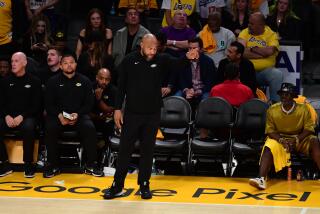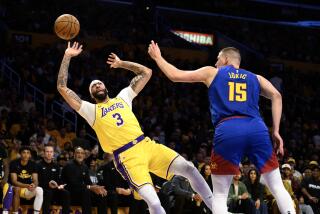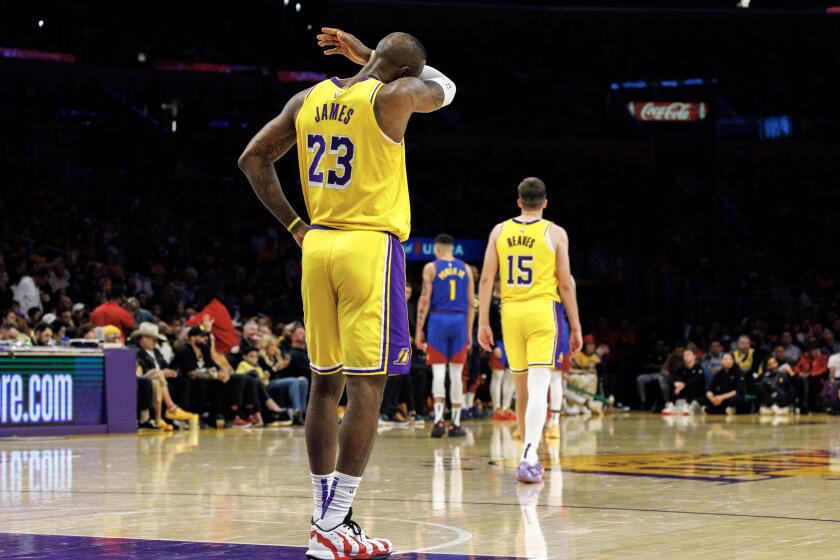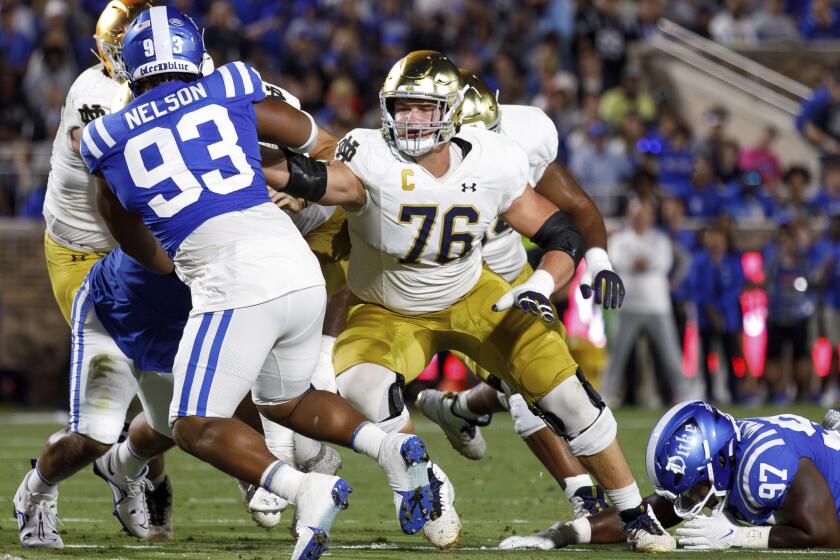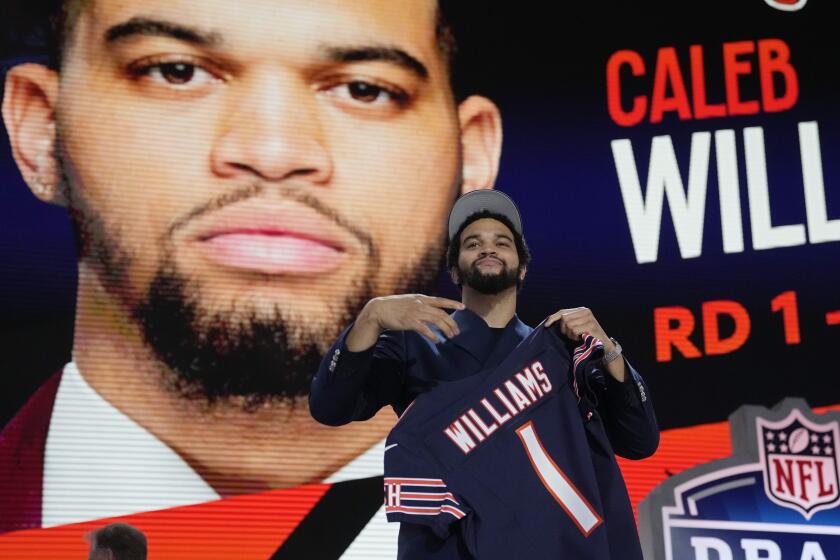They’ve Created a Monster at Candlestick
The stadium built at Candlestick Point more than 44 years ago can feel like the coldest and windiest place in the country on fog-shrouded summer nights. It and the spit of land it sits on were named for an all-but-extinct wading bird.
But Candlestick Park is as loved around here as an arthritic family pet.
Now, the arena that locals affectionately call the Stick is at the center of a standoff on corporate naming rights -- an issue that has riled sports fans and the advertising-averse across the country.
In what may be a symbolic gesture, voters next month will decide on a ballot proposition that says the stadium at Candlestick Point should keep the name Candlestick Park.
But there’s a complication: The San Francisco 49ers, who call the park home, in late September sold the publicly owned stadium’s name to Bay Area-based Monster Cable Products Inc. Signs at the stadium already have been changed to “Monster Park.” No one knows exactly what the legal impact will be if the proposition passes.
Even the ballot argument against Proposition H stresses that a vote for the Stick is a symbolic cry in the wind -- “an opportunity to send a signal that San Francisco remains on the front lines against the increased ... commercialization of everyday life.”
Nationwide, voters have cast their lot on such an issue only once, in Wisconsin, when they authorized the Green Bay Packers in 2000 to sell the naming rights to revered Lambeau Field for a minimum of $100 million up front. The deal would have blunted the burden to taxpayers for a major field renovation.
But the field -- named for Packer founder Curly Lambeau -- has iconic status among fans, and even the mayor of Green Bay and the football team’s president vehemently opposed the name sale. Under those conditions, there were no corporate takers and the deal never happened.
San Francisco is writing that story in reverse. It’s no surprise that some here would take a strong stand. After all, this is the city that passed a first-of-its-kind ordinance to keep big-box chain stores at bay.
“Across the political spectrum, voters and sports fans are fed up with the intrusion of corporate marketers into every part of our lives and culture,” said Board of Supervisors President Matt Gonzalez, chief architect of the ballot measure. “I doubt voters in San Francisco will want to trade local history and everything associated with Candlestick Park just for more corporate advertising.”
In 1988, there were only three naming-rights deals at major league sports facilities, with a total value of $25 million. Today, there are 67 such deals valued at $3.63 billion, said Dean Bonham, a Denver-based sports marketing consultant who has negotiated more than half a dozen deals.
Bonham believes only a handful of arenas are untouchable, most notably Fenway Park in Boston and New York’s Yankee Stadium. (To the horror of many, even the Dodgers’ new owner is mulling a naming deal for Dodger Stadium.)
High schools and colleges are striking deals too: There’s the Taco Bell Arena at Boise State University in Idaho. And, of course, there are all those bowls, such as the Tostitos Fiesta Bowl.
Novel marketing doesn’t end there.
Massachusetts legislators caused a minor uproar last year when they proposed selling naming rights to state parks and forests, including the Walden Woods immortalized by Henry David Thoreau. Criticism wilted the plan.
New York City has earned its share of scorn with a deal that makes Snapple the official purveyor of beverages in all schools and city buildings. In exchange, Snapple is promoting New York as a tourist destination. (New York tabloids have glibly renamed the metropolis “The Big Snapple.”)
Many wonder what’s next.
Joining Supervisor Gonzalez to promote San Francisco’s ballot measure recently was Gary Ruskin, executive director of Oregon-based Commercial Alert. Ruskin’s group condemns the pervasive creep of advertising into public spaces.
“Are we going to sell naming rights to neighborhoods?” he asked. “Are we going to have Burger King Bernal Heights? The McDonald’s Mission? Where’s it going to end?”
Then there’s the risk of corporate scandal and civic embarrassment, a la Enron Field in Houston. Now it’s Minute Maid Park.
“Monster Corp. could be the next corporate monster,” Ruskin suggested, saying San Francisco must draw “a line in the sand.”
In the case of Candlestick Park, however, the line already has been crossed once.
San Francisco was among the trendsetters when it authorized the 49ers to sell Candlestick naming rights in 1995 to 3Com Corp. Fans hated it. Hardly anyone outside the team, city officials and traffic reporters called it 3Com Park.
That deal, and the name, expired in 2002. Then-Mayor Willie Brown tried to forge a new deal, but supervisors blocked him. Ruskin hailed the Stick as “the first professional sports stadium in the United States to return to a popular name.”
But then Mayor Gavin Newsom took office early this year and, facing a record $352-million budget shortfall, began pushing for a new four-year deal. Early this summer, seven of the 11 supervisors agreed, allowing the 49ers to open negotiations.
Under terms of the deal with Monster Cable, the city would get half of the naming rights revenue -- but no less than $3 million. The money already has been written into this year’s parks and recreation budget.
But Gonzalez was bothered. He and three other supervisors voted to place the matter on the ballot as allowed under the City Charter. But by then, negotiations on a naming deal were well underway.
The mayor is unapologetic.
“This is a sports franchise,” Newsom said. “This is hardly unique, and there was precedent” with 3Com.
He said comments by Gonzalez and others that San Francisco is on the verge of a massive corporate sellout are “extreme and absurd.”
Candlestick Park is an old facility paid for with public funds, but new stadiums these days rely mostly on corporate help. The San Francisco Giants’ private home, SBC Park, is an example.
Newsom said the city would need corporate sponsors for a new football stadium and should not send a signal that they are unwelcome.
As for Proposition H, no one doubts where voters’ loyalties are likely to lie on Election Day. What happens after that is less clear.
The city attorney says approval of the measure would not overturn the name sale, but one possibility is a lawsuit to strip the Monster Park moniker off the stadium.
At the least, a “yes” vote would thwart an extension of the four-year naming deal and prevent a future deal for any publicly funded arena on the same land.
If the measure were to fail, there would likely be no objections from Monster Worldwide Inc., operator of the Monster jobs website and a more famous bearer of the name.
*
(BEGIN TEXT OF INFOBOX)
By any other name
In 1988, there were three naming rights deals in place at major league sports facilities across the country, with a total contract value of about $25 million. Today, there are 67 such deals for a total contract value of $3.63 billion. Here is a look at some teams that have played in stadiums with corporate-sponsored names.
*--* Team Year Stadium Anaheim Angels* 1998-2003 Edison International Field 1966-1997 Anaheim Stadium
Baltimore Ravens 2003- M&T; Bank Stadium 2002-2003 Ravens Stadium 1998-2002 PSINet Stadium
Chicago White Sox 2003- U.S. Cellular Field 1991-2002 New Comiskey Park
Denver Broncos 2001- Invesco Field at Mile High** 1960-2000 Mile High Stadium
Houston Astros 6/5/2002- Minute Maid Park 2/27/2002 Astros Field 2000-2001 Enron Field
Los Angeles Lakers 1999- Staples Center** 1988-1999 Great Western Forum 1967-1988 The Forum
Oakland Athletics 2004- McAfee Coliseum 1998-2004 Network Associates Coliseum 1998 Oakland-Alameda County Coliseum 1997-1998 UMAX Coliseum 1968-1997 Oakland-Alameda County Coliseum
San Diego Padres 2004- PETCO Park** 1997-2004 Qualcomm Stadium 1980-1996 Jack Murphy Stadium
San Francisco 49ers 2004- Monster Park 2002-2004 Candlestick Park 1995-2002 3 Com Park 1971-1994 Candlestick Park
San Francisco Giants 2004- SBC Park 2000-2003 Pacific Bell Park
Seattle Seahawks 2004- Qwest Field 2002-2004 Seahawks Stadium
Texas Rangers 2004- Ameriquest Field 1994-2004 The Ballpark in Arlington
Washington Redskins 1999- FedEx Field 1997-1999 Jack Kent Cooke Stadium
*--*
* Known as the California Angels, 1965-96
** Team moved from former location to new stadium.
Sources: www.ballparks.com; the Bonham Group; Times reports
Los Angeles Times
More to Read
Get our high school sports newsletter
Prep Rally is devoted to the SoCal high school sports experience, bringing you scores, stories and a behind-the-scenes look at what makes prep sports so popular.
You may occasionally receive promotional content from the Los Angeles Times.
